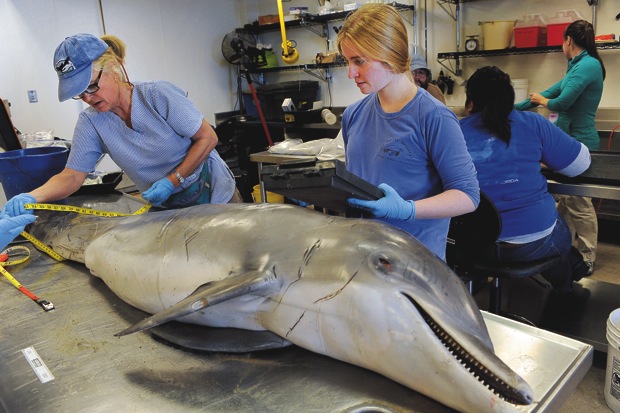“The rolling sand dunes and gentle waves of Emerald Isle are so picturesque that I almost forget why I am here: to conduct a necropsy on a stranded bottlenose dolphin,” wrote Samantha Emmert from the Duke Marine Lab in early 2014. Emmert spent her junior year researching an outbreak of morbillivirus epizootic, a measles-like virus that has ravaged dolphin populations along the Atlantic Coast since last summer.
For her independent study, Emmert worked closely with Victoria Thayer M.E.M. ’82, Ph.D. ’08, coordinator of the Marine Mammal Stranding Network, a team that tracks strandings along North Carolina’s central coast. When Thayer heard about a stranding, she would notify Emmert, and the two would rush to locate the dolphin on the shore. Then they would either transport the mammal to the lab or perform a necropsy (an autopsy performed on an animal) right there on the beach, depending on its stage of decomposition.
“We began by carefully observing the exterior of the animal to look for unusual lesions, signs of interactions with fisheries or boats, or other strange scars,” says Emmert. “Then, we cut the animal open to look for the cause of death internally.” She helped Thayer by sharpening knives, preparing vials, jotting notes, and cutting samples of lung or spinal tissue. It was grisly work, teeming with blood and strong odors, but Emmert said she was more fascinated than grossed out.
Since July 2013, more than 1,000 dolphins have been found stranded along the East Coast—nearly triple the counts of past years. Still, “this probably reflects only a small percentage of the actual casualties,” says Emmert. “The vast majority of them don’t wash up on shore.” The cause of morbillivirus is unknown, but ocean pollutants may be weakening dolphins’ immune systems, making them more susceptible to infection.
Emmert compared her findings to another wave of morbillivirus mortalities among dolphins in the late 1980s. “If this epizootic continues to follow trends of the 1987-88 morbillivirus event, we can expect dolphins to continue dying in exceptionally high rates through early summer,” predicts Emmert, now a senior. “We’re getting a lot of young dolphins, so that doesn’t really bode well for the next generation.” What’s more, federal funding has been cut for the Stranding Network, threatening its ability to respond to the surge of strandings. Emmert is spreading the word about the need for stable funding for marine mammal welfare organizations.
A native of the Bronx, Emmert grew up beside Long Island Sound, aware of the toxic waste and debris that sullied its waters. Her particular interest in marine biology emerged last summer, during a DukeEngage internship at a marine mammal hospital in Sausalito, California. In the spirit of conservation, Emmert was a dorm eco-rep for Alspaugh. She later worked with Students for Sustainable Living and helped organize the Duke Free Store, a student recycling initiative for unused books, supplies, and other objects. After graduating from duke, Emmert plans to pursue an advanced degree specializing in marine mammal health.

Share your comments
Have an account?
Sign in to commentNo Account?
Email the editor